PR
X
Calendar
Category
Hiekka aikaa
(731)Suomi
(322)Lappi
(53)Kuksa ククサ
(23)Luonto
(25)erämaa
(18)huomio
(162)muovimalli
(32)musiikki
(301)eläinpelastus
(79)veitset (knives)
(41)Olkoon voima kanssasi!
(35)剣の巻
(37)今は昔
(21)陽明学
(441)道家思想
(126)孫子兵法
(12)人鏡論
(13)海外通販/個人輸入
(26)日本独立計画
(49)隷属への道
(25)多目的道具
(206)現代甲冑考 - Modern Armors -
(80)実用物具考
(85)民間防具考
(177)民間防衛
(219)戦ふ日本刀
(97)實戦刀譚
(103)臨戦刀術
(94)古傳鍛刀術
(2)北欧
(118)西欧
(260)中欧
(35)彫金
(20)意匠
(58)『傭兵たちの挽歌』
(141)2011 jalkeen
(34)TORIAEZ
(11)Needle Felted Animals
(262)Weekly SAK
(597)Weekly SL
(485)Weekly EXP
(39)Keyword Search
▼キーワード検索
2024年12月
2024年11月
2024年10月
2024年09月
2024年08月
2024年11月
2024年10月
2024年09月
2024年08月
2024年07月
2024年06月
2024年05月
2024年04月
2024年03月
2024年06月
2024年05月
2024年04月
2024年03月
カテゴリ: 隷属への道

Photo by Ian 'Harry' Harris
Youtube - Movies & Shows
The Sum of All Fears - Trailer
・考察「君は『はだしのゲン』の町内会長を助けるか?
〜 Their lobby group is aiming to revive of the Japan Empire.
当稿作成につき、久しぶりにイデオロギー系の書籍を調べてみましたら
本当の 地獄の世界 みたいになっていて、かくのごとき場所からはさっさと退散したいものです。
前回からの続きで渡部昇一 Shōichi Watanabe 氏と日本会議 The Nippon Kaigi
渡部氏は生前、日本会議の機関誌『日本の息吹』などにて
自説「東條・マッカーサー史観」なるものを(ああ、相も変わらず)展開していました
( 『日本会議の野望』 P.41 ~ 44)。
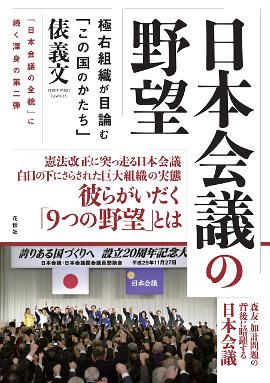
日本会議の野望 極右組織が目論む「この国のかたち」
俵義文 著 花伝社 発行
https://books.rakuten.co.jp/rb/15510557/
この「東條・マッカーサー史観」とは、東條英機の宣誓供述書と、
ダグラス・マッカーサー Douglas MacArthur 元帥の米国議会での証言が
「日本は侵略戦争をしたのではない、自衛戦争をしたのだ」という点で一致している、
・・・とするものです。
しかしながら、同史観の根拠はマッカーサー証言のほんの一部分の抜粋にすぎず、
赤字の部分 のみです。
なお、他サイト・ブログなどで翻訳・解説されている方がいらっしゃいますので、
当記事は引用量の参考程度にしていただいて、日本語訳、
及び「東條・マッカーサー史観」なるものの捏造ぶりを是非ご検索頂ければと思います。
Senator Hicknlooper. Question No.5:
Isn't your proposal for sea and air blockade of Red China the same strategy by
which Americans achieved victory over the Japanese in the Pacific?
Gen. MacArthur. Yes, sir. In the Pacific we bypassed them. We closed in.
You must understand that Japan had an enormous population of nearly
80 million people, crowded into 4 islands.
It was about half a farm population.
The other half was engaged in industry.
Potentially the labor pool in Japan, both in quantity and quality, is as good as
anything that I have ever known.
Some place down the line they have discovered what you might call the dignity of
labor, that men are happier when they are working and constructing than when
they are idling.
This enormous capacity for work meant that they had to have something to work on.
They built the factories, they had the labor,but they didn't have the basic materials.
There is practically nothing indigenous to Japan except the silkworm.
They lack cotton, they lack wool, they lack petoroleum products,they lack tin,
they lack rubber, they lack a great many other things, all which was in the Asiatic basin.
They feared that if those supplies were cut off, there would be 10 to 12 million people
unoccupied in Japan.
Their purpose, therefore, in going to war was largely dictated by security.
The raw materials - those countries which furnished raw materials for their
manufacture - such countries as Malaya, Indonesia, the Philippines, and so on - they,
with the advantage of preparedness and surprise, seized all those bases,
and their general strategic concept was to hold those outlying bastions,
the islands of the Pacific, so that we would bleed ourselves white in trying to
reconquer them, and that the losses would be so tremendous that we would
ultimately acquiesce in a treaty which would allow them to control the basic
products of the places they had captured.
In meeting that, we evolved an entirely new strategy.
They held certain bastion points, and what we did was to evade those points,
and go around them.
We came in behind them, and we crept up and crept up, and crept up, always
approaching the lanes of communication which led from those countries,
conquered countries, to Japan.
By the time we had seized the Philippines, and Okinawa, we were enabled to
lay down a sea and Navy blockade so that the supplies for the maintenance of the
Japanese armed forces to reach Japan.
The minute we applied that blockade, the defeat of Japan was a certainty.
The ultimate result was that when Japan surrendered, they had at least 3,000,000
of as fine ground troops as I have ever known, that laid down their arms because
they didn't have the materials to fight with, and they didin't have potential to
gather them at the points of importance where we would attack.
We hit them where they weren't; and, as a result, that magnificent army of theirs,
very wisely surrendered.
The ground forces that were available in the Pacific were probably at no time more
than one-third of the ground forces that Japan had available;
but, as I say, when we blockaded that way, when we disrupted their entire
economic system, they could not supply the sinews to their troops that were
necessary to keep them in active combat and , therefore, they surrendered.
・・・
Ed Imparato, General MacArthur Speeches and Reports 1908-1964 p.170 ~171.
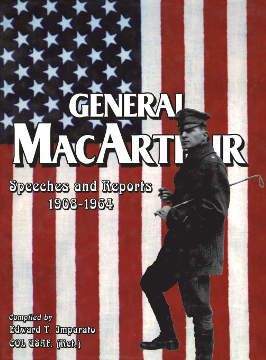
上に引用した 赤字部分 のみが「侵略戦争ではない」根拠だったとは、
なんとまあ、薄っぺらい史観でしょうか。
渡部氏は中国を「シナ」と呼び、韓国、朝鮮を蔑視する言動が多々ありましたが、
その一方で KCIA の統一教会(※)や、日本会議と親交があるなど、寄らば大樹の陰か、
こうでもしないと仕事を維持できなかったのかと、うんざりした気分になります
(渡部氏の言説を真剣に受け取っていた読者はきっとグレますね)。
※ Moon's church founded by Korean CIA chief as political tool, panel says
https://www.cia.gov/library/readingroom/docs/CIA-RDP81M00980R000600200010-3.pdf
さて、今後歴史関係者の人たちがしなければならないのは、
渡部氏らの「東郷・マッカーサー史観」捏造による言論・書籍の見直しと、
同史観を元にした「侵略戦争ではなかった」論の展開を、
ここで一旦凍結することに他なりません。
それはあたかも、旧石器捏造発覚後の再検証のような作業になりますから、
歴史学の専門家の人たちがこの問題に手を出さない、
これまであえて黙殺して手を出さなかった理由はよくわかります。
なにしろ「この世のどぶさらい」のような徒労ですから。
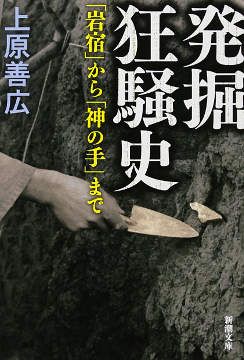
発掘狂騒史 「岩宿」から「神の手」まで
上原善広 著 新潮社 発行
https://books.rakuten.co.jp/rb/14612006/
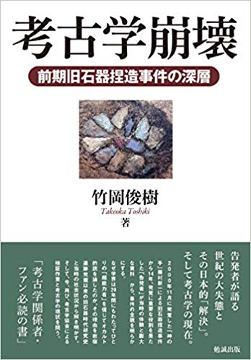
考古学崩壊 前期旧石器捏造事件の深層
竹岡俊樹 著 勉誠出版 発行
https://books.rakuten.co.jp/rb/12940464/
その一方で、渡部氏たちがつくった歴史教科書が、現在でも発行され流通しているのです。
発行元は日本会議 Nippon Kaigi の出版部門 明成社 Meisei-sha,Inc. です。
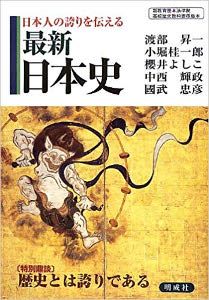
最新 日本史 文部科学省検定済教科書
渡部昇一、櫻井よしこ、中西輝政、國武忠彦、小堀桂一郎 著 明成社 発行
明成社 Meisei-sha,Inc. からは、
細部は違えど目的を同じくする書籍がたくさん発行されています。
昨年11月に歴史本(ジャンルは歴史書なのかフィクションなのか未だ不明)を出した
流行作家が総指揮を執ったドキュメンタリー DVD (非売品)もあります
(なんや、結局この人、日本会議に参加しとるやんけ!)。
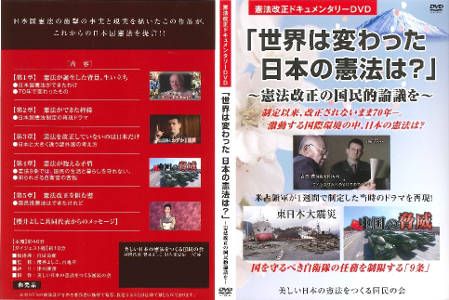
「世界は変わった 日本の憲法は?」 ~憲法改正の国民的議論を~
美しい日本の憲法をつくる国民の会 制作 非売品
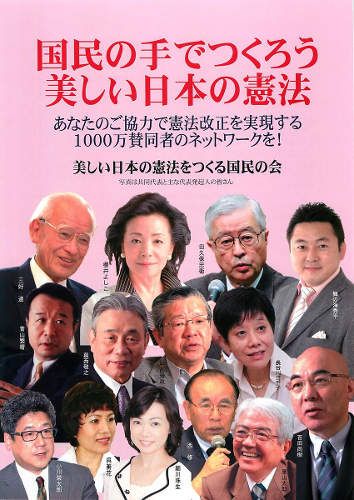
※美しい日本の憲法をつくる国民の会のメンバーたち
上に述べた通り、
「東郷・マッカーサー史観」が捏造であることはすでにネットで流布されています。
手品のタネはとっくに公開されているわけですから、
「侵略戦争」を否定することで憲法改正に直結させることはほぼ不可能と言えましょう。
同様に、くだんの歴史本が 100万部売れようと、4,000万部売れようとも、
残念ながら日本国民の意識が大きく変わって、
憲法改正という日本会議 Nippon Kaigi の悲願が叶うこともないでしょう。
ただし、こうした楽観的観測から皆がこの問題から手を離してしまうと、
「卒業式の胴上げで皆が一斉に支えるのをやめたら
胴上げされてた人がコンクリートの地面に落下してグシャッ・・・」
という事件があるように、あれよあれよという間にクーデターが起きて
超国家主義・極右政権が成立する、などということもありえますから気を抜けません。
クーデターといえば、 イザヤ・ベンダサン(山本七平) 氏が
『日本教について』(文藝春秋) にて以下のようなことを書いています。
__(山県)大弐は「江戸城を攻略するには品川に火を放って・・・・・・」
という意味のことを言っただけであり、
三島氏は結局、『檄文』を読み上げただけでした。
本当にクーデターを企図したなら、戦車隊を懐柔して皇居と放送局に突入したはずですから。
(『日本教について』所収「『檄文』の論理」より)
たしかに、三島由紀夫氏と「楯の会」は
陸上自衛隊市ケ谷駐屯地で クーデターを呼びかけた だけであって、
実際行動として決起するには至っていません。
たとい三島氏が陸上自衛隊戦車隊の懐柔を試みても、
命令系統外からの指示ですから、自衛隊員は動かなかったでしょう。
のちにオウム真理教も自衛隊空挺団の取り込みを試みていますが
テロで使用したのは教団内で製造した毒ガス類でした。
日本会議 Nippon Kaigi は「隊友会」 Taiyu kai と連携しての憲法改正を狙っていますから、
戦車部隊を懐柔しようとする可能性も、なきにしもあらずです。
しかし、自衛隊組織を利用しようとする部外者に対する自衛隊員の警戒心は強いでしょうから、
戦車部隊が命令系統外からの指図で動くことはないでしょう。
それに加えて、日本会議関係者の日頃の言動から察するに、
かの団体は「皇室」を政治目的に利用してはいるが皇族に対する敬意はほぼ皆無です。
皇族に敬意を持たない団体の関係者たちが、
クーデターを起こして皇居に侵入すれば一般国民がどのように反応するかは言わずもがなです
(__では、いかにして特定団体がクーデターを起こすかは、後日考察してみましょう)。
同様に、これは渡部氏を含む日本会議関係者の著書の共通項として__、
日本史を「私たちの物語」、すなわち日本人の総論として広く提示するために、
個々の家系の歴史を器用につまみ食いして利用しつつ、
「私たち」に取り込みたくない負の(?)部分は踏みにじっておざなりにする、
といった、著者本人が歴史を上から俯瞰したような気で、侮る態度が鼻につきます。
この手の夢物語 fantastic story では、にわか歴史ファンしか喜ばないでしょう。
そして、彼らは後になってまんまと嵌められたことに気がつくのです。
だから現象そのものは放っておけばよい、
これらの安っぽい歴史本の消費期限はそれほど長くありません。
次回は渡部氏の言霊論を取り上げる予定です。


お気に入りの記事を「いいね!」で応援しよう
Last updated
2019年01月19日 12時22分49秒
[隷属への道] カテゴリの最新記事
-
'『ゼイリブ "They Live" 』って30年前ぐ… 2019年03月13日
-
'『チャーリー・ウィルソンズ・ウォー "Ch… 2019年02月27日
-
'「10番目の男というルール "The Tenth Ma… 2019年02月13日
【毎日開催】
15記事にいいね!で1ポイント
10秒滞在
いいね!
--
/
--
© Rakuten Group, Inc.











